Trending
Opinion: How will Project 2025 impact game developers?
The Heritage Foundation's manifesto for the possible next administration could do great harm to many, including large portions of the game development community.
An analysis of player responses to various implementations of mobile game freemium models and what that says about the market as a whole.

Currently the most popular model for mobile apps on the market is a Free-to-play model monetised with in-app purchases. However in-app purchases can be a tricky proposition. Your users are only going to continue playing the game if they find it fun or rewarding in some way, so over monetising your game can drive away players before they can contribute to the churn that keeps your power users happy. But at the same time; while mobile games are a creative endeavour, they are also a business. As such you want to get the optimum amount of revenue possible. This leaves us with the question: ‘When does it become too much?’
The First step to finding the answer is to look at a cross section of the mobile games market. These are all games that have in-app purchases in some form or another. They have also received varied receptions from their user bases. Using our tool, Player XP, I am able to find out how many reviews actually offer some kind of constructive feedback. I can then quickly find out how many of those express a negative sentiment. I then use that as a baseline to measure against the number of reviews that offer constructive feedback about the game’s monetisation, and how many of those also express a negative sentiment. Currently my sentiment is being derived using the review star system (negative sentiment being 1 or 2 star reviews). In the coming months, we will integrate a more sophisticated sentiment system into Player XP. This will provide even more information and granularity than the current star system.
Below is the tabulated overview of data I uncovered using Player XP:
Name | Constructive | Negative Constructive | Monetisation | Negative Monetisation | All Reviews |
|---|---|---|---|---|---|
Dungeon Keeper | 3128 | 2088 | 1623 | 1292 | 7221 |
Candy Crush Saga | 104639 | 43975 | 34889 | 16721 | 522965 |
Clash of Clans | 135193 | 38529 | 35949 | 12934 | 455187 |
Real Racing 2 | 7034 | 573 | 2048 | 201 | 22731 |
Real Racing 3 | 19672 | 6906 | 6252 | 3165 | 54966 |
It shows the number of constructive reviews, the number that are negative, the number that talk about monetisation, and the number that are both negative and talk about monetisation. For your convenience, there is also a column showing the total number of reviews we have processed. Analysing this data reveals some interesting points:
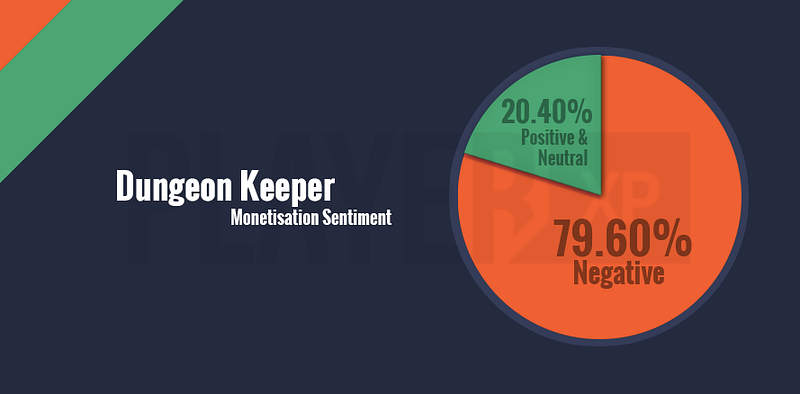
To put these figures in perspective: 43% of their reviews are constructive, Of those reviews, 67% are negative. Monetisation is talked about 52% of the time. 61% of negative reviews talk about the game’s monetisation.
This flags a large problem with the way the game handled monetisation, while Dungeon Keeper Mobile (DKM) is not very well received anyway (67% negative), negative sentiment increases substantially by 13% when looking at monetisation. There are a number of possible contributing factors that include: The price/value exchange of in-app purchases, negativity from the Dungeon Keeper Franchise’s “hardcore” fan base, and negative press coinciding with DKM’s release. If you then look at the reviews themselves, you begin to see a pattern emerging. Below are a few examples of what I mean:
“The graphics are ugly, everything takes forever (unless you shell out tons of money) and it’s not even that funny.” — USA user
“If you need more FRuSTraTioN in your life, play this game. Built in delays trying to frustrate you to buy coins to speed things up, then even when you finally cave the game still wants your money and wastes your time, what kind of goals does this company desire… What happened to playing a game for entertainment?” — Canadian User
“This was one of my all time favs and EA has made it a shadow of its former self. Is it sooo hard to port over a great game and sell it for a one time reasonable price? Instead we get this lame piece of junk cash grab. I hate you EA and every other game maker that has embraced this in app purchase model.” — USA User
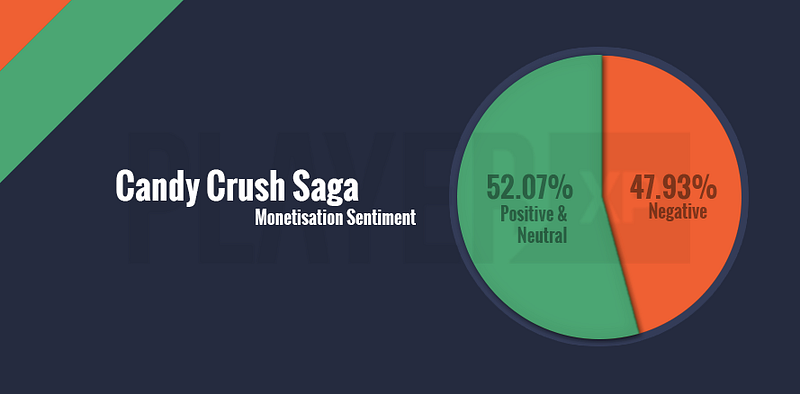
To put this chart in perspective: 20% of their reviews are helpful, Of those reviews, 42% are negative. Monetisation is talked about 33% of the time. 38% of negative reviews are about the game’s monetisation.
Candy Crush Saga is a highly successful game for King. But 42% is quite a significant percentage of people who dislike the game. However upon further inspection 39% of reviews are also distinctly positive. This shows that Candy Crush is highly polarising. However of all the talking points discussed in player reviews, Monetisation is the most contentious with an 8% increase in negativity when compared the games overall sentiment. This is not insignificant, but can be partially attributed to people being more negative about monetisation in general. When looking at the review content you start to see that the users feel the game is too expensive. Below are some examples:
“Overall a good puzzle type game and the gameplay is actually pretty good. My biggest problem is how they limit your gameplay so much unless you pay through the nose for it. I feel like I only ever am playing a tutorial because I don’t want to spend money on what is overall just a phone game. Other than that it’s a good time waster” — USA User
“Good solid well designed iteration of the match 3 genre with plenty of thought put into making it varied. But the pay to play and at times win aspects annoy. Not sure why, I accept the developers need profit. But it still does, especially as there’s been plenty of thought put into extracting money as into making the ga,e(sic)fun.” — UK User
“Why do I have to wait two and a half days until I can continue playing? It’s like companies are running out of ideas on how they can make more money on apps. This world is ending.” — Canadian User
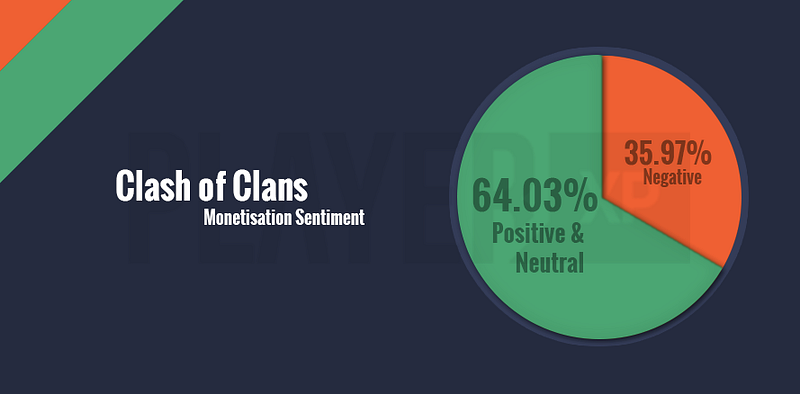
To put this chart in perspective: 30% of their reviews are helpful, of those reviews, 28% are negative. Monetisation is talked about 29% of the time. 34% of negative reviews are about the game’s monetisation.
We already know that Clash of Clans is a highly successful game for Supercell. Much like candy Crush Saga, monetisation negativity increases for Clash of Clans by 8%. What is interesting is that there are a lot of players complaining about the monetisation who feel frustrated with how the game feels like they’re being punished for not paying. Below are a few examples:
“I’ve been playing clash for about a year now and in townhall 9. The waiting time is ridiculous. 12+ days for one thing and how long it takes to earn the resources needed. I don’t want to quit but it takes weeks to just upgrade one thing and don’t even get me started about the walls. I don’t want to rush but jeez it takes months. Just makes things a few million cheaper or make it easier to get gold an elixir. I don’t like how you have to use your hard earned money to get high in this game.” — USA User
“The introduction of half hour guards is purely intended to grab money — it makes it impossible to save resources because instead of going on to see you have been attacked once or twice I now go on to see I’ve been attacked 7,8,9,10 times, each one taking a healthy chunk of my resources” — UK User
“There comes a time in the game when you can not get ahead unless you spend money on purchasing gems. As you get attacked and your resources are depleted. You can not do upgrades without resources. Good game up until know! Chad” — Canadian User
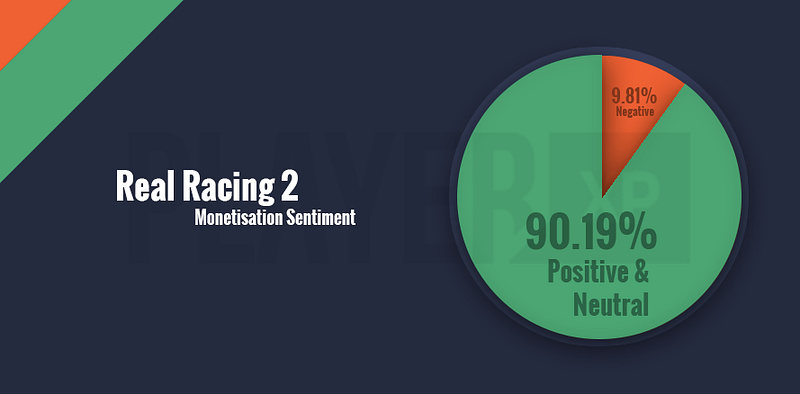
For Real Racing 2, 31% of their reviews are helpful. Of those reviews, 8% are negative. Monetisation is talked about 29% of the time. When talked about, it is referred to negatively 10% of the time. 35% of negative reviews are about the game’s monetisation.
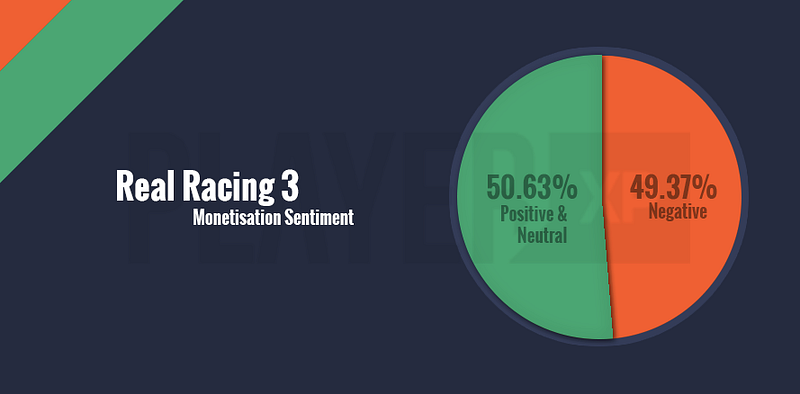
For Real Racing 3, 36% of their reviews are helpful. Of those reviews, 35% are negative. Monetisation is talked about 32% of the time. When talked about, it is referred to negatively 50% of the time. 45% of negative reviews are about the game’s monetisation.
What is interesting here is that these two games are in the same franchise. This gives us a good look at what a change in tactics may do for your game. Real Racing 2 is game that you must purchase with a price tag of £3.99 (£4.99 on iPad), however it still contains in-app purchases. On the other hand, Real Racing 3 has a more conventional Freemium model with in-app purchases. And what we’ve found is that Real Racing 2 has a player base that appears to be smaller than Real Racing 3. However users are far less vocal about the way the game is monetised.
There are a number of possible explanations for this, the first being that Real Racing 2 has a smaller but more dedicated user base. As such, they are more willing to both buy the game and pay for in-app purchases. Another possible explanation is that with going completely freemium, changes to the monetisation model have made the game appear to be of less value per dollar or pound spent. If we begin to dive into the monetisation reviews themselves, you can see a significant difference between the ways the games are played. For Instance when looking at monetisation for Real Racing 2 a typical Review will look like something like this:
“The best racing game on the app store. It has awesome graphics and great detail, its not impossible to earn cash, and if youre not very good at racing games on iphone, stick it on easy and you’ll have no problem adjusting to it! Never has any lag, even on my old 3rd gen ipod touch. Great game” — Canadian User
“Amazing quality with graphics, races are decent one of the best racing games available, but could do with a few more car choices, apart from that a very good game worth the money :)” — UK User
On the other hand when you begin to look at Real Racing 3 reviews that mention monetisation you begin to get a different picture:
“You’re going to make money, imagine how much you would make in smaller increments. Reduce the price of everything dramatically and people will buy more!” — USA User
“Really po’d with gold earnings and using them up too fast. Should be able to have a choice to buy and upgrade with either cash or gold. Upgrades cost disproportionately to gold earnings. It’s ok at amateur and pro am levels. At pro and higher levels all you can do is use gold for nearly all upgrades and most car buys. Also pr ratings on races has too much of a jump in relation to car pr, again having to use gold.” — Canadian User
So overall, Some of the most interesting insights are those related to the Real Racing Franchise. Real Racing 2 proves that if your pricing model is good, players will notice and mention it in their review of the app. These figures also go towards disproving the idea that you can only do in-app purchases if you make the game free. If you’re targeting a smaller but more dedicated group of players, this may in-fact be a superior model for you. Unsurprisingly there were complaints about the costs of both Clash of Clans and Candy Crush Saga. However, the games’ being otherwise well made and fun give the developers a lot of good faith with their users. On the other hand, Dungeon Keeper shows what happens if you take a beloved franchise and tool it towards what a large portion of it’s core audience considers a “money grab”. The game had already failed before anyone had ever gotten their hands on it because of the stigma of freemium amongst many of the “old guard”.
All this data I have collected and analysed has come from our tool Player XP. Player XP is a review analysis and review aggregation platform for iOS games that has been produced by Hertzian Ltd. As the CIO of Hertzian Ltd I was heavily involved in the production of Player XP, and I was still wowed by our tool when I began to use it for my report. I would urge anyone who is interested in what I have produced here to check out the platform over atwww.playerxp.io. This analysis and write-up was created over the span of two days, and I’d love to see what other people could produce with the tool.
Read more about:
BlogsYou May Also Like